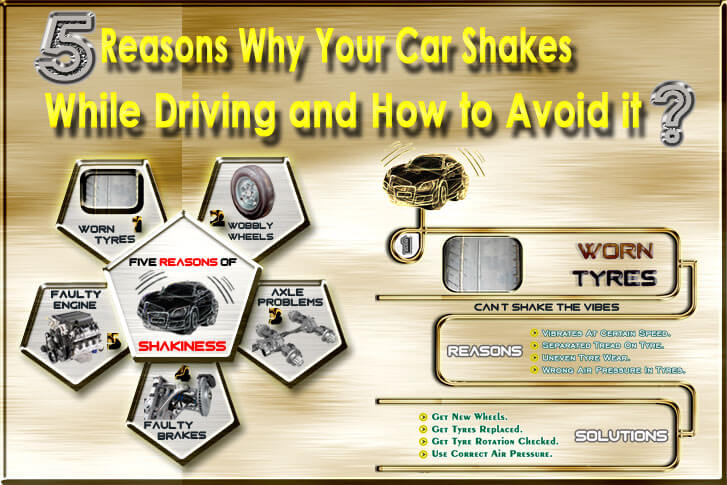
Owning a car today is not as difficult as it was some decades ago, but the biggest challenge is to keep it running and well maintained. Most drivers/owners find it difficult to track the reasons why their car vibrates, shakes, or shudder during the run. If you are one among those few unfortunate ones, then this infographic on 5 reasons why a car vibrates is going to be very informative and useful for you.
1- Tyres:
In the list of five most common reasons, tyres are the most dominating factor that plays a vital role in shaking your car while driving. There are several reasons that can contribute to the vibration problem, but here are some of the most major issues listed regarding tyres.
The most common issue is your car vibrates at certain speeds; it might be due to separated tread on tyres, uneven tyre wear, and use of wrong air pressure or wrong profiled tyres. Wrong air pressure is so dangerous that it can lead to an accident because it reduces the tyre grip and control on the road. In the case of shaking car on certain speeds your car requires tyre balance, if the tyre treads are separated then it requires tyre replacement. Tyre rotation check is also important to be checked if your tyres are de-shaped due to environmental changes. You always need to use the right kind of tyres for your vehicle that you can check with your Owner’s Manual.
2- Wobbly Wheels:
All four wheels of your car when equally balanced can give you a joyful ride but sometimes when they are unbalanced, they make the ride so irritating that you don’t want to drive at all. Sometimes any of the four wheels faces wobbliness or play that starts from the “hub” of your wheel. Several other issues cause the wobbliness in wheels that lead to shakiness. Usually, in the case of manual steering, you can feel the impact direct on your steering wheel that starts shaking while you drive. A wheel alignment issue can cause this problem. In any case of wobbliness, you need to try the following solutions. Diagnose your powertrain and properly torque your lug nuts on the hubs. Determine the run out on your wheels when they spun on high revs. If the run out exceeds ½ inches then straightaway replace the wheels. Never compromise on this issue because it can endanger your life.
3- Axle:
Axles are the backbone of your drive train because they handle the power from the engine and bumps coming from the road. They get bent with time and then cause wobbliness or shakiness. It also reduces the performance of your car. When your car faces jolty drive it means it needs driveshaft inspection. CV Joints fall under the same category and need timely inspection and boots need to be changed. In the case of front wheel drive vehicles, CV joints include new axles which hopefully would solve the problem.
4- Brakes:
Does your car vibrate badly when you apply brakes? If so, then you are a victim of damaged and faulty brakes. There is a strong probability that your car is tooling about with a rusty brake rotor or de-shaped disks. The rotor is the shiny disc-shaped component that helps stopping the car. It can be bent out of shape due to heavy wear and tear, usually from overheating and emergency braking. Rotor underperforms when it faces flatness issues. The only solution to these issues is to change the callipers and brake pads. If problem persists, you might want to change the rotors too.
5-Engine:
Engine is the central power unit of your car and sometimes a shake or jolt will originate from the engine compartment, because the engine isn’t performing at its peak. There could be several factors such as the engine is not getting enough air and jolting, fuel or spark that needs to run smoothly, but it is not burning well. When several engine issues combine together, vibration and jolts occur during acceleration. Engine issues need to be fixed accordingly to get a smoother ride experience. Smooth running engine means vibration-free ride.
Disclaimer:
These five reasons that make your car vibrate aren’t the only possible culprits but these are the most common ones. when in doubt, it’s always a good practice to visit an automotive service professional for further diagnostics.


